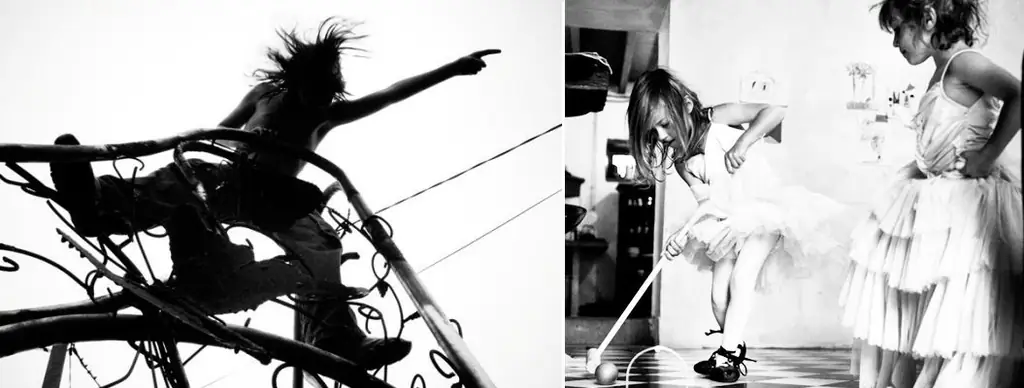- Author Adrian Jeff jeff@psychologosportal.com.
- Public 2023-12-17 05:06.
- Last modified 2025-01-24 14:09.

A naughty child: how to achieve obedience without yelling, straps and sedatives
How do we usually look for the approach to the “problem child”? We are trying to find a successful model of upbringing in our environment. “My child at 3 years old does not obey, he is on his ears, no one is his authority. And the neighbor's baby is two years old - already now ideal, obedient. Maybe take a closer look at how she behaves with him, how she brings up, and learn from the experience? Take your time - you can make a mistake here.
Baby … For this tiny, dear little man, mother is ready to sacrifice her life. I would like to give the child all the best, to teach everything, so that his fate develops successfully and happily. But everything is not always smooth along this path. Sometimes hands drop helplessly. The child is naughty, he is completely uncontrollable and does not hear you - what to do?
This article is for you if:
- whims, stubbornness, tantrums or neglect of parents for a child are not uncommon;
- there is no longer any strength to exist in the mode of eternal shouts;
- nerves are constantly at the limit, and when you break down, you feel guilty;
- one “age crisis” smoothly flows into another, and there is no end in sight;
- in my head a whole "talmud" from the advice of a psychologist, friends and grandmothers - but no result.
With the help of Yuri Burlan's system-vector psychology, we will figure out how to achieve the obedience of children and establish calm, trusting relationships with them.
Age crises: wait or act?
Often, problem behavior in children is associated with a difficult transition period in childhood:
- Does the child disobey at 2 years old? - Apparently, the crisis of three years has already begun.
- Is the child still not listening at 4 years old? - Obviously, the crisis has dragged on.
But while we calm ourselves down, precious time is spent, and the problems only get fixed. Already at the age of 7, the child does not obey and "freaks out" - how will he learn at school? How can you build relationships with people?
The development of the baby's psyche really passes certain age lines. But this does not mean at all that parents will have to "sit on the Corvalola" until the age of majority of their beloved child. Crisis can be turned into a springboard for taking off to new heights in child development. And at the same time, the relationship of the baby with the parents will become more intimate and warm. You can start with simple steps.

Step 1. Choose the optimal parenting model
How do we usually look for the approach to the “problem child”? We are trying to find a successful model of upbringing in our environment. “My child at 3 years old does not obey, he is on his ears, no one is his authority. And the neighbor's baby is two years old - already now ideal, obedient. Maybe take a closer look at how she behaves with him, how she brings up, and learn from the experience? Take your time - you can make a mistake here.
Parenting methods that work great for your neighbor's kid can be useless and even destructive for your child. Let's look at the examples:
-
The baby is given the properties of the skin vector. He is fast, agile, agile. Rational and pragmatic: looking for benefits and benefits for himself in everything. This is a natural earner: he brings toys into the house from everywhere. Likes to compete and compete, to be the first in everything. Disobedient behavior in such children is expressed in the fact that they "stand on their ears", scatter everything, do not seek to learn and obey. If you have a so-called hyperactive child, it is important to know the right approach to him.
Motivation for him can be a desired purchase or a trip to a new, interesting place. The skin child must clearly understand “what will happen to him from this” if he fulfills your request. For example, like this: "If you now quickly put away the toys, then we will have time not only to go to the store, but also to get to the playground." Shouts and attempts to shame just won't work.
An effective punishment for disobedience for such a kid is a restriction in space (for example, isolation in his room) and in time (cancel or reduce the time for watching a cartoon, playing with gadgets, etc.). But it is absolutely impossible to beat and spank. The supersensitive skin of such a child is under extreme stress. To numb the pain, opiates (endorphins) are released, on which the child becomes addicted over time. And then, without understanding why, he simply "runs into a belt."
-
The baby is given the properties of the anal vector. He is a slow "kopusha", a little awkward, unsportsmanlike. You cannot drag him to run and jump - he is much more willing to sit on the couch with a gadget. His talent is a systemic and analytical mindset. Therefore, he is determined to do everything leisurely, scrupulously, paying attention to detail.
It will not be possible to motivate such a child with gifts and trips - they do not have such significance for him. But he really needs the approval and praise of his parents. His natural aspiration is obedience, he wants to be the best son and student. Do everything perfect and get high marks.
But even such a kid can become a naughty child. In his case, he is a stubborn, disputant on any occasion. Why is this happening? This happens when his unhurried rhythm of life runs counter to his mother's - fast, active and agile. For example, the child is constantly urged on, rushed, pulled. He reacts to this with even stronger inhibition - stupor, stubbornness, resentment.
To change this situation, give your baby more time to complete any task. Support his desire to do something efficiently rather than quickly. Be sure to praise for a great result. If you have to go somewhere, it is better to warn the child in advance. Abrupt changes are stress for him, he needs to prepare, tune in, finish the job he is doing at the moment.

-
The kid is the owner of the visual vector. Emotional, impressionable, "tears are close." At the same time, he is very fearful, prone to fear - and empathic. Spares bugs and spiders, saves ladybugs from the rain. Potentially, he can grow up as a major cultural figure or realize himself in the humanistic professions of a doctor, educator.
If such a child does not obey, this is expressed in him in violent tantrums and tears. The fact is that the baby simply does not yet know how to cope with that huge emotional range that is assigned to a visual person from birth. Education of feelings can help here - through reading literature for compassion.
And by the age of six or seven, it is already possible to involve such a child in the feasible help of the weak. Help an elderly neighbor, visit a sick friend. When a child realizes his emotions in empathy with others, his tantrums and fears go away.
-
The kid is the carrier of the sound vector. Low-emotional introvert, immersed in his thoughts. For parents who are fast and active, this may cause doubts: is everything all right with the child? For example, a sound child of 3 years old does not obey. What if he may not even come to the call, ignore requests? It seems as if he is "thinking hard" - not right away, he answers with a delay. May even start talking later than other children. Often tends to be alone, isolated from the noisy children's company. It happens that you will not be interested in anything at all, except for "gadgets". How to be?
In fact, such a child is not assigned a low, but, on the contrary, the highest potential of abstract intelligence. His thought process is deep. A great scientist may well grow out of such a child. For this it is necessary to create the necessary conditions.
First of all, it is sound ecology. The child's especially sensitive ear reacts with strong stress to noise, screams, loud music. Create a quiet atmosphere in your home. Classical music is useful - a quiet background so that the child listens attentively. It is also worth talking to him in lowered tones, softly, clearly and clearly. Avoid idle talk and too expressive, emotional presentation.
Modern children are carriers of 3-4 or more vectors out of eight possible. To build an accurate model of education, you need to take into account the properties of each of them.
It is not at all difficult to comprehend this science - thousands of parents around the world use it successfully. They are happy to share how easy it becomes to communicate with the child. From constant war and strength testing, their parenting became a source of great joy:
The training "System-Vector Psychology" not only helps to understand the child's soul and to find the keys to it. He gives a whole system of recommendations with the help of which the parental word for the child becomes important and meaningful. Let's reveal a few of these secrets.
Step 2. Make the parent word meaningful
If the child does not obey, the parents often say: "He does not hear me at all." How to make parenting words meaningful to your baby?
-
Talk to the child in his language. Each vector has its own key words that correspond to our nature. For example, the owners of the skin vector are rational and pragmatic, value their time and resources. From them you can hear: "Well, I wasted my time", "this is logical", "and what is the use of this?" etc. Your skin baby is guaranteed to hear you if you set a time frame for him - “you have 5 minutes to get ready”. Explain what he will get if he completes the task on time - "if you manage to clean everything quickly, there will be time to play with the computer."
Each vector has its own keywords. Knowing them, you are guaranteed to get the baby's attention.
-
Use prohibitions and restrictions correctly. The nature of the human psyche is “I want”. The entire development of a child is built on the evolution of his desires. Therefore, for the psyche of any person, the most traumatic words are "no" and "no". The psyche does not know the word "no". If you constantly use these words in speech, the child stops hearing his parents. It's like saying to him, “No. You can't want anything. And you will not develop. " Then the baby is fenced off.
Therefore, it is worth talking to a child so that he understands: his goals and desires are achievable. For example, instead of "no, you won't go for a walk, you are not healthy" - you can say: "Yes, you will definitely go for a walk as soon as you recover." In rare cases, when it is impossible to do without a ban, it is imperative to explain the reason and offer the child an alternative. That is, to soften the ban: “You cannot eat ice cream in the cold. But we can go to a cafe and drink your favorite cocoa."
- Being heard is about having a deep emotional connection with your child. The technique of "emotional disregard" that some parents use when a child rebelles further alienates you from each other. And over time, the baby will hear you less. What to do? It is also impossible to regret “oh you, poor thing, you are sad, you are angry” every time. This is detrimental: the baby grows up self-centered, self-centered.
The way out is in the good sensory development of the child through reading literature for compassion. On the one hand, it develops the sensory component of the child's psyche. He will be able to be imbued with your feelings in the future, and not only suffer about himself. On the other hand, when the two of you empathize with someone else (the hero of the book), this creates a sensual rapprochement between you, an emotional community. When there is a second or third child in the family, reading together works for the emotional bonding of siblings. They do not grow up as “competitors”, but as people who are truly close to each other.
Where to start a new upbringing?
The reasons for the problems of disobedience in a child and a reliable way to reduce them to zero were disclosed at the training "System-vector psychology" by Yuri Burlan.
It is possible to live in perfect harmony with your own child, regardless of what properties he was born with. Understanding it to the depths of the soul, find the "golden key" to each problem situation. Have a warm, sincere contact with him. This may seem fantastic if you have already frayed your last nerves. But the results of hundreds of happy parents confirm that naughty children change as if by magic.
Sign up for the next free online trainings "System Vector Psychology" here.






